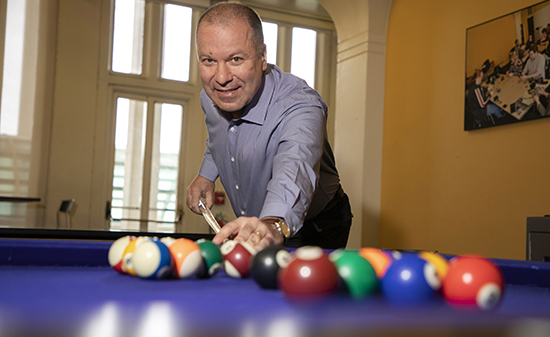5 Questions with Faculty: Cristian Lenart
 |
|
Cristian Lenart specializes in combinatorics -- an older field of mathematics that was originally associated with puzzles and games before taking on a new role in recent years. (Photo by Patrick Dodson)
|
ALBANY, N.Y. (Nov. 14, 2019) — Professor of Mathematics Cristian Lenart is an expert in the field of algebraic combinatorics. His goal, in a manner of speaking, is to build more accessible models for complex objects.
Lenart was recently awarded $200,000 from the National Science Foundation (NSF) to continue his work in combinatorial representation theory and combinatorial algebraic geometry. A 2014 winner of the SUNY Chancellor’s Award for Excellence in Scholarship and Creative Activities, Lenart has been continuously funded by five NSF grants and one Simons Foundation grant since 2004.
As a student, scholar and a mentor, Lenart has spent more than 30 years studying mathematics at some of the world’s most prestigious institutions of higher education. He has spent the last 20 years at UAlbany introducing new generations of mathematicians to the field.
But perhaps his most unexpected role was serving as an “acting” coach for an Academy Award-winning writer (who has also been known to fiddle in front of the camera). More on that later…
How is your field of research is used in mathematics and other areas?
Combinatorics is an older field of mathematics, which was originally associated with puzzles and games, while during the last decades it assumed a new role. It went through an essential transformation, due to the crucial contributions of my mentors at the Massachusetts Institute of Technology, Richard Stanley and Gian-Carlo Rota.
Combinatorics studies discrete structures, arising as arrangements of objects according to specified rules. Its new role is due to the fact that combinatorial objects are now used to encode complex structures in geometry, algebra, computer science, physics, chemistry, biology, social sciences etc.; these objects are also suitable for implementation on a computer and experimentation.
What made you pursue combinatorics?
I was drawn to combinatorics when preparing for the International Math Olympiad, as part of the Romanian National Team. The problems we worked on were mostly of combinatorial nature, and I appreciated the very ingenious thinking required.
Later in life, during my postdoctoral studies at MIT, I had the chance to be mentored by the two experts I mentioned above (Stanley and Rota), who transformed combinatorics into a central area of mathematics. Last but not least, while researching at the Max Planck Institute in Germany, I enriched and deepened my fascination with combinatorics.
What are some of the challenges of your field?
There are many open problems in algebraic combinatorics, as the researchers in my field build and study more and more complex discrete models. Another challenge for us is to bridge the gap between our area and other areas of mathematics. Mathematicians in different fields speak very different “mathematical languages,” so we need to learn how to understand each other and to connect each other’s work even better.
What is one thing that people don’t know about you?
Well, before filming the Oscar-winning movie “Good Will Hunting,” Matt Damon came to MIT to do research for his role. I had the pleasure and honor to be one of the people who “trained” him in mathematics. He is an absolutely wonderful person. “A cool guy,” as my son would put it.
What is your favorite part about working at UAlbany?
The interaction with the students and colleagues. Over the course of my life, I have never wanted to have any other profession than the one I am in, and among the different subjects, I cannot imagine myself doing anything else but mathematics. Furthermore, the vision of the University, which is oriented both toward student success and research excellence, has made my career choice all the more rewarding.
In the 20 years I have spent here, I have witnessed UAlbany excelling in all its endeavors and raising them to new levels. I am truly excited to be part of this journey.
![]() For more news, subscribe to UAlbany's RSS headline feeds
For more news, subscribe to UAlbany's RSS headline feeds
A comprehensive public research university, the University at Albany-SUNY offers more than 120 undergraduate majors and minors and 125 master's, doctoral and graduate certificate programs. UAlbany is a leader among all New York State colleges and universities in such diverse fields as atmospheric and environmental sciences, business, education, public health,health sciences, criminal justice, emergency preparedness, engineering and applied sciences, informatics, public administration, social welfare and sociology, taught by an extensive roster of faculty experts. It also offers expanded academic and research opportunities for students through an affiliation with Albany Law School. With a curriculum enhanced by 600 study-abroad opportunities, UAlbany launches great careers.


